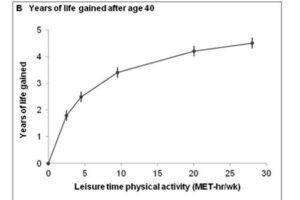Exercise is paramount to maintain enduring health, but also plays a pivotal role for life longevity as well as emotional one’s well-being. There is no shortage of science behind exercise and longevity and how it has an impact on our lives and disease prevention. Exercise as ‘functional fitness’ also helps us as we age as it allows us to maintain physical capabilities for everyday activities and enjoying life. As we age, we need to acknowledge common challenges in maintaining an exercise routine and put emphasis on it’s both near term and long-term importance to our overall quality and length of life. Exercise should be considered as part of a holistic approach to heath which stresses its importance along with other health practices such as nutrition, stress management, and sleep.
The Science Behind Exercise and Longevity
It is no secret physical activity can have numerous benefits to one’s overall health and life longevity, but let’s break the key ways it does and what it means for us.
Immediate Benefits
There are some mental benefits to exercise that follow a session which include improved thinking and reduced short-term feelings of anxiety. Regular physical activity helps keep your mind sharp as you age, reduces depression and anxiety risks, and helps you sleep better.
Weight Management
Physical activity plays an important role in weight management by burning calories and increasing metabolism, which helps contribute to either weight loss or maintain weight. Additionally, regular physical activity helps build muscle mass, which further enhances calorie burning, even during periods of rest. However, it’s important to combine physical activity with a balanced diet for optimal weight management results.
Reduce Your Overall Health Risk
Regular moderate physical activity can help reduce risk of diseases such as heart and stroke as well as helping with blood pressure and improve cholesterol level. Regular physical activity can help reduce risk of developing type 2 diabetes, contracting an infectious disease, and some forms of cancer. Another benefit is exercise strengthen your bones and muscles which is important as you age
Strengthen Your Bones and Muscles
As you age, maintaining the health of your bones, joints, and muscles becomes crucial as they support movement and daily activities. Muscle-strengthening exercises, such as weightlifting, help preserve or build muscle mass and strength, addressing the natural decline experienced with aging.
Improve Your Ability to do Daily Activities and Prevent Falls
Engaging in everyday activities like climbing stairs or grocery shopping is vital for maintaining independence. Inactive middle-aged or older adults face a higher risk of functional limitations, hindering daily tasks. For older adults, a diverse range of physical activities, including aerobic, strength, and balance training, enhances physical function and reduces the risk of falls. Participation in multicomponent physical activities, whether at home or in a structured program, is beneficial. Furthermore, regular physical activity decreases the likelihood of hip fractures, a significant concern for older adults, by promoting overall strength and balance.
Live Longer
Increasing moderate-to-vigorous physical activity by a small amount among US adults aged 40 and older could prevent an estimated 110,000 deaths annually. Simply adding 10 minutes of activity per day can make a significant difference. Additionally, taking more steps each day correlates with a decreased risk of premature death from all causes.
Manage Chronic Health Conditions & Disabilities
By engaging in exercise on a regular schedule, people with chronic conditions and disabilities are able to manage symptoms and improve their quality of life. For example, the Centers for Disease Control and Prevention details that regular exercise has been shown to be able to reduce pain and improve mood for adults with arthritis, help control blood sugar and lower risk of heart disease and nerve damage for people with type 2 diabetes, and support living activities for people with disabilities.
Source: https://www.cdc.gov/physicalactivity/basics/pa-health/index.htm
Years of Life Gained After 40 By Being Physically Active

Researchers from Brigham and Women’s Hospital have quantified how many years of life are gained, by being physically active at different levels, among all individuals as well as among various groups with different body mass index (BMI). Courtesy of BWH.
Graph source: https://news.harvard.edu/gazette/story/2012/11/how-much-exercise-is-enough/
Functional Fitness: Living Better, Not Just Longer
Functional fitness focuses on exercises that replicate everyday movements, enhancing strength, flexibility, and mobility by targeting multiple muscle groups and joints. Suitable for all ages and fitness levels, it improves functional abilities, making daily tasks easier and enhancing quality of life. Function fitness is particularly beneficial for seniors as it aids in balance and stability which is crucial for fall prevention, and counteracts age-related stiffness, preserving range of motion. Integrating functional fitness into your routine fosters independence and supports physical well-being across the lifespan.
Source: https://www.yahoo.com/lifestyle/functional-fitness-workout-makes-daily-020205053.html
Exercise and Mental Well-being
Exercise isn’t just about physical health—it’s also essential for mental well-being. Research shows that regular exercise improves emotional health, lowers the risk of mental illness, and can be effective in treating conditions like depression and anxiety. In fact, it’s been found to be as effective as antidepressants or therapy for mild to moderate depression.
How exercise makes us feel better?
Regular exercise is often pursued for its positive impact on mood, concentration, and overall outlook on life. The relationship between exercise and mental health is complex, but there are numerous ways it can benefit mental well-being:
- Exercise alters brain chemicals like serotonin, stress hormones, and endorphins.
- It promotes better sleep, aiding in mood regulation.
- Exercise boosts feelings of control, coping skills, and self-esteem through goal achievement.
- Physical activity serves as a distraction from negative thoughts and offers opportunities for new experiences.
- Socializing during exercise provides valuable social support.
- It increases energy levels and acts as a healthy outlet for frustrations.
- Exercise reduces skeletal muscle tension, promoting relaxation.
Moreover, the physical benefits of exercise are crucial for individuals with mental illness, improving cardiovascular health and overall physical well-being. This is particularly important as individuals with mental health concerns are at a higher risk of developing chronic physical conditions such as heart disease, diabetes, arthritis, and asthma.
Source: https://www.betterhealth.vic.gov.au/health/healthyliving/exercise-and-mental-health
Exercise as Part of a Holistic Approach to Health
Holistic medicine takes into account the entirety of an individual, addressing not just symptoms but also the underlying causes of health issues. This approach considers the interconnectedness of physical, social, spiritual, mental, emotional, and environmental factors that contribute to overall well-being. Exercise plays a significant role in promoting holistic health by impacting various facets of well-being. It improves physical health by mitigating pain, preventing disease, and enhancing bodily function. Socially, exercise fosters connections and reduces feelings of isolation through group activities. Spiritually, it provides a sense of purpose and fulfillment. Mentally and emotionally, exercise stimulates the mind, reduces stress, and enhances coping mechanisms. Additionally, exercise can positively influence environmental health by encouraging engagement with different surroundings. Recognizing exercise as a valuable tool in holistic medicine is essential for cultivating holistic health and well-rounded individuals.
Source: https://www.physio-pedia.com/Exercise_as_an_Intervention_of_Holistic_Medicine
Importance of Exercise and Life Longevity
Exercise is not only crucial for maintaining enduring physical health but also plays a pivotal role in enhancing life longevity and emotional well-being. The science behind exercise and its impact on longevity is well-documented, with numerous immediate benefits such as improved mental clarity, reduced anxiety, and better sleep quality. Additionally, exercise aids in weight management, reduces overall health risks, strengthens bones and muscles, and improves daily functional abilities, especially for seniors. Incorporating exercise into a holistic approach to health is essential, as it addresses the interconnectedness of physical, social, spiritual, mental, emotional, and environmental factors that contribute to overall well-being. It is imperative to prioritize exercise as part of a comprehensive health regimen, alongside other practices such as nutrition, stress management, and sleep, to optimize both the quality and length of life. Let’s embrace exercise as a cornerstone of holistic health and take proactive steps to incorporate it into our daily lives for a healthier and happier future.
Read More:
Understanding Influential Factors, Blue Zones, and Cutting-edge Technologies for Extending Lifespan
Photo Credit:
Photo by Li Sun: https://www.pexels.com/photo/man-working-out-2294361/





